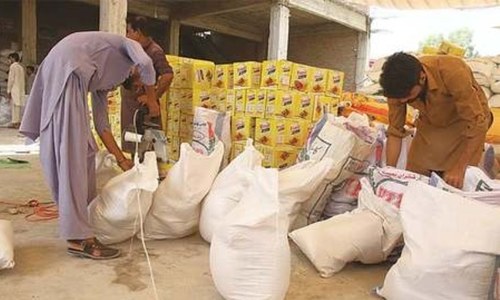PAKISTANIS distribute Zakat and are generous in helping the less fortunate in the absence of a social security net. However, their religiosity does not stop them from indulging in profiteering during Ramazan.
To ensure adequate supply in the local market, the cabinet has banned the export of all edible items until further orders. Incidentally, exports to the Gulf states surged by 36 per cent during 10 months of this fiscal year mainly owing to a jump in the export of basmati rice (59pc), meat (57pc) and vegetable and fruits (100pc) as compared to a year ago. Quantity-wise, sales have been much higher owing to a big depreciation in the rupee.
Simultaneously, the government has appointed Shaista Bano Gillani as the new Chairman of the Competition Commission of Pakistan (CCP) after removing, with the help of the court, three top CCP officials whom it accused of being in collusion with the cartels. Notwithstanding the collusion charge, the real problem lies in the lengthy and cumbersome process of penalising those who rig the market. In fact, regulatory bodies created to protect consumers have been turned into toothless organisations. The PTI government should enable them to function effectively.
Big retailers are charging 100pc margin on certain basic kitchen items even though it was about 15-20pc a few years ago
A World Bank study shows that between 2003 and 2011, sales worth 1pc of GDP were overcharged due to the presence of cartels in Pakistan. The recent probe into the sugar scam has revealed collusion of sugar mills and wholesalers. The sector’s revenues soared without improving productivity. When the international sugar price was quoted at Rs47 per kg, the price at utility stores was at Rs70 and the open domestic market rate was at Rs80-90.
In the current crisis, says a former Karachi Chamber of Commerce and Industry chief Haroon Agar, the big retailers are charging 100pc margins on certain basic kitchen items, up from 15-20pc profits earned some years ago. The wholesale market where middle-sized farmers and arhtis take their produce – perishable items – for auctioning is predetermined in an opaque manner, says a study on Price Stabilisation Mechanism in Pakistan: Food Market Issues and Challenges conducted by State Bank Pakistan (SBP) senior economist Asma Khalid and deputy director Sabahat.
Researchers noted that the quoted wholesale prices do not represent prices at which the actual transactions take place. A significant amount of intermediaries’ profits and services charges are added to enhance product value. Official committees responsible to run the management of the public markets have no representation of growers and consumers.
The much-needed investment in physical infrastructure, required to keep prices of agricultural commodities and farmers’ returns stable and reduce post-harvest losses, is lacking. These include absence of a developed network of cold storage chain management (for perishable items) grain silos and farm processing facilities. New investment undertakings engaged in operating warehousing or cold store chain facilities are eligible for a 3-year tax holiday. Borrowers can avail traditional or Sharia-compliant financing facilities under a central bank scheme. Somehow the private investment is shy to invest.
The prime minister’s think tank members have now called for a downward revision of the central bank policy rate and provision of further liquidity for banks to boost the economy under strong recessionary headwinds. The forum was recently established to recommend mitigation of risks arising out of the Covid-19 triggered crisis. Lately, the lending rate for industrial investment has been reduced to 7pc.
As the commercial banks are investing in a T-bill at a cut-off yield of 7.1pc against 9.5pc recorded only weeks ago, the market expects a further cut in the discount rate when the Monetary Policy Committee meets this month. Investors would likely wait for a further reduction in the policy rate.
Owing to unabated inflationary government borrowings for non-productive purposes, the SBP data shows that the money in circulation as of March 20 this fiscal year rose by Rs628.5 billion compared to Rs387bn during the same period in the previous year while economic activities were slowing down and private sector credit was shrinking.
For a variety of reasons, farm output is not keeping pace with rising food requirements and food imports (exclusive of edible oil) have doubled over the past five years. The central bank researchers observe that the trend is more pronounced in case of minor crops, pulses, fruits and vegetables whose cultivation has been also hurt by farmers switching to major crops especially when they are guaranteed a minimum price. This suggests, they wrote, that domestic prices of these commodities are increasingly vulnerable to the global prices, exchange rate, export policy of trading partners and the domestic import policy.
Even the government keeps increasing utility prices while being unable to improve the performance of bleeding utility companies in any meaningful way. The think tank members of the prime minister’s team have urged the government to pass on the benefit of reduced international oil prices to the consumers. The forum is examining the viability of reducing the general sales tax on consumer goods from 17pc to 5pc to kickstart consumer spending for the next two years. The government also needs to work simultaneously on long-term policies to keep prices of essential consumer goods stable.
Published in Dawn, The Business and Finance Weekly, May 4th , 2020













































